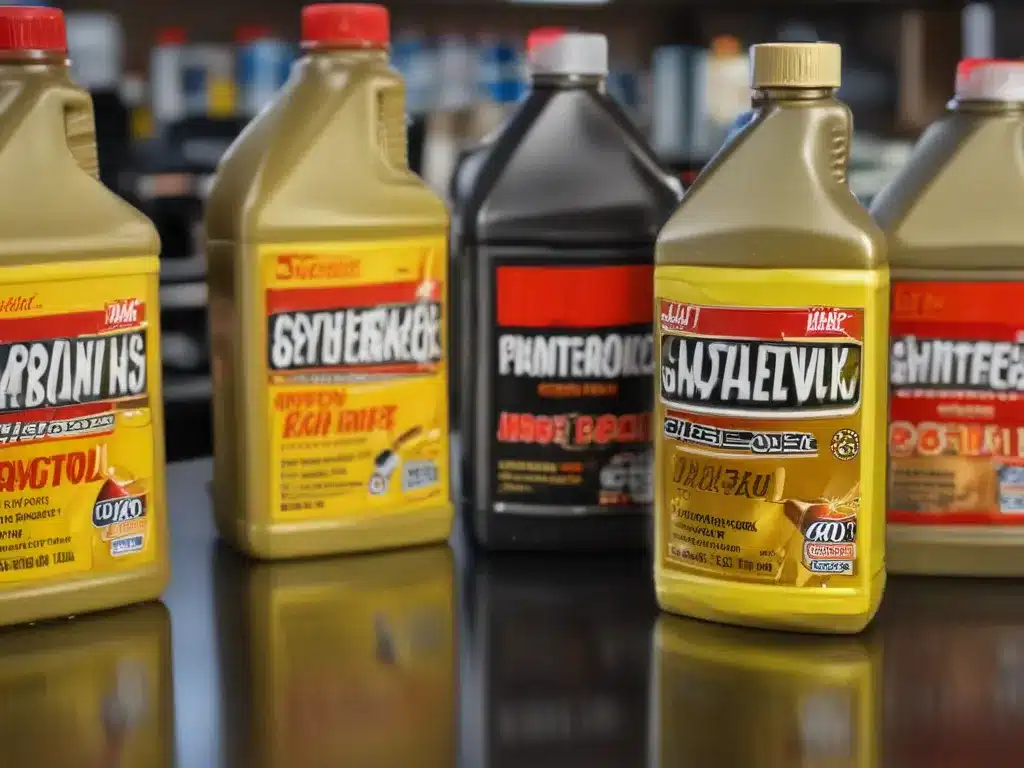
Unleashing the Power of Synthetic Oils
As a car enthusiast, I’ve always been fascinated by the evolution of motor oils. When I first started driving, I remember my dad insisting that I use conventional oil for my old beater car. “That’s the only way to go,” he’d say, “synthetic stuff is just a gimmick.” Well, times have changed, and so has my understanding of motor oils. Let me tell you, the synthetic revolution has been a game-changer, and I’m here to separate the myths from the facts.
You see, back in the day, synthetic oils were a bit of a mystery. They were often associated with high costs and questionable performance. But let me tell you, the synthetic motor oil of today is a far cry from those early formulations. These advanced lubricants have come a long way, and I’m here to show you why they’re the real deal.
Debunking the Myths
One of the most persistent myths about synthetic oils is that they’re not suitable for older vehicles. The reasoning behind this is that synthetic oils are “too slippery” and can cause leaks or seals to fail. But let me set the record straight: modern synthetic oils are formulated to be compatible with a wide range of engine types, including those in older cars.
In fact, many manufacturers now recommend switching to a high-quality synthetic oil, even in older vehicles. The reason is simple: synthetic oils provide superior protection against wear and tear, helping to extend the life of your engine. They’re also better at withstanding high temperatures and maintaining their viscosity, which means your engine will run smoother and more efficiently.
The Science Behind Synthetic Oils
Now, let’s dive a little deeper into the science behind synthetic motor oils. These lubricants are created through a complex chemical process that involves breaking down and re-assembling hydrocarbon molecules. This results in a more uniform and consistent oil that outperforms conventional oils in a number of ways.
For starters, synthetic oils have a higher resistance to thermal breakdown, which means they can withstand the high temperatures and pressures inside your engine without losing their lubricating properties. This translates to better protection for your engine components, reduced wear and tear, and improved fuel efficiency.
But the benefits of synthetic oils don’t stop there. These advanced lubricants also have a lower tendency to form sludge and deposits, which can clog up your engine and reduce its performance over time. And because they’re more resistant to oxidation, synthetic oils can actually last longer between changes, saving you time and money in the long run.
Real-World Advantages
Now, I know what you’re thinking: “Okay, the science sounds great, but how do synthetic oils perform in the real world?” Well, let me share a personal anecdote that might just convince you.
A few years ago, I decided to switch my high-mileage Subaru over to a top-of-the-line synthetic oil. I was a bit skeptical at first, but the results were downright impressive. Not only did my car start running smoother and more responsive, but I also noticed a significant improvement in fuel economy. And when it came time for my next oil change, I was amazed to find that the oil still looked remarkably clean and fresh, even after thousands of miles.
But don’t just take my word for it. Many professional mechanics and industry experts have also weighed in on the benefits of synthetic oils. They’ve reported everything from extended engine life and reduced maintenance costs to improved cold-weather performance and better protection against sludge buildup.
Choosing the Right Synthetic Oil
Now, I know what you’re thinking: “If synthetic oils are so great, why doesn’t everyone use them?” Well, the truth is, not all synthetic oils are created equal. There’s a wide range of quality and performance levels out there, and it’s important to choose the right one for your vehicle.
When it comes to selecting a synthetic oil, I always recommend doing your research and consulting your owner’s manual. Look for oils that meet or exceed the manufacturer’s recommended specifications, and don’t be afraid to spend a little extra for a high-quality product. After all, your engine is the heart of your vehicle, and it deserves the best protection you can give it.
And speaking of protection, let’s not forget about the importance of regular oil changes. Even the best synthetic oil in the world won’t do you much good if you’re not keeping up with your maintenance schedule. So be sure to follow the recommended change intervals for your vehicle, and don’t skimp on the quality of the oil you use.
Conclusion: Embracing the Synthetic Revolution
Well, there you have it, folks. I hope I’ve been able to convince you that synthetic motor oils are the real deal, and not just some marketing gimmick. These advanced lubricants have come a long way, and they’re now an essential part of keeping your engine running at its best.
So, the next time you’re in the market for an oil change, don’t be afraid to make the switch to a high-quality synthetic. Your engine will thank you, and you’ll be well on your way to experiencing the true power and performance of this revolutionary technology.
And if you’re looking for a great place to get your oil changed, I can’t recommend AutoOilAndFluid.com enough. They use only the best synthetic oils and have a team of experienced mechanics who know how to get the job done right. Give them a try, and see for yourself why synthetic is the way to go!


